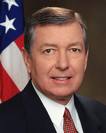
John Ashcroft/doj photo
WASHINGTON — Ex-Atty. Gen. John Ashcroft is off the hook.
In an 8-0 ruling, the Supreme Court tossed out a lawsuit against Ashcroft. It overturned a 9th Circuit Court of Appeals decision, saying the former Attorney General under President Bush enjoyed “qualified immunity” from a lawsuit filed by Abdullah al Kidd, a former University of Idaho football player who converted to Islam.
The court ruled that Ashcroft did not clearly violate the 4th Amendment right against unreasonable searches and seizures.
FBI agents arrested Kidd in 2003 at Dulles Airport and detained him for 16 days in three different states as a material witness supposedly for a pending case. He was never charged and never called as a witness.
Kidd claimed Ashcroft abused his power by detaining him as a material witness. He also alleged the arrest was part of a bigger plan by the Bush administration to round up Muslims, regardless if whether they had ties to terrorism.
But the Supreme Court, in a ruling written by Justice Antonin Scalia, wrote: “The affidavit accompanying the warrant application (as al-Kidd concedes) gave individualized reasons to believe that he was a material witness and that he would soon disappear.”
“Qualified immunity gives government officials breathing room to make reasonable but mistaken judgments about open legal questions. When properly applied, it protects ‘all but the plainly incompetent or those who knowingly violate the law’,” the court wrote.
”We hold that an objectively reasonable arrest and detention of a material witness pursuant to a validly obtained warrant cannot be challenged as unconstitutional on the basis of allegations that the arresting authority had an improper motive. Because Ashcroft did not violate clearly established law, we need not address the more difficult question whether he enjoys absolute immunity.”
Justices Ruth Bader Ginsburg, Stephen G. Breyer and Sonia Sotomayor voted to overturn the lower court ruling, but conceded that the law in this area is not completely clear. Justice Elena Kagan did not participate.
Read Opinion
Tidak ada komentar:
Posting Komentar